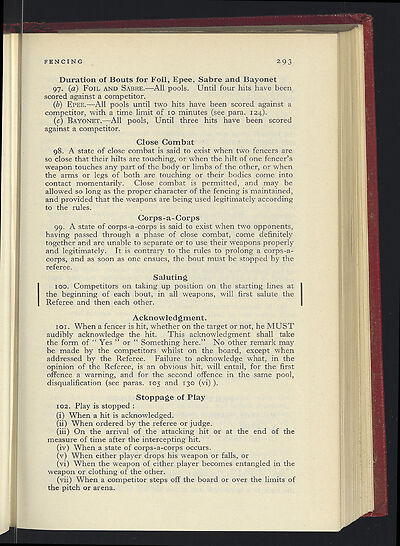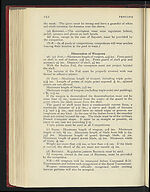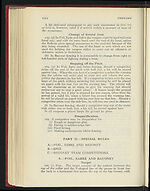1939-40
(311)
Download files
Complete book:
Individual page:
Thumbnail gallery: Grid view | List view

FENCING
293
Duration of Bouts for Foil, Epee, Sabre and Bayonet
97. (a)
F
OIL AND
S
ABRE.
—All pools. Until four hits have been
scored against a competitor.
(b)
E
PEE.
—All pools until two hits have been scored against a
competitor, with a time limit of io minutes (see para.
1
24).
(c)
B
AYONET.
—All pools, Until three hits have been scored
against a competitor.
Close Combat
98.
A state of close combat is said to exist when two fencers are
so close that their hilts are touching, or when the hilt of one fencer's
weapon touches any part of the body or limbs of the other, or when
the arms or legs of both are touching or their bodies come into
contact momentarily. Close combat is permitted, and may be
allowed so long as the proper character of the fencing is maintained,
and provided that the weapons are being used legitimately according
to the rules.
Corps-a-Corps
99• A state of corps-a-corps is said to exist when two opponents,
having passed through a phase of close combat, come definitely
together and are unable to separate or to use their weapons properly
and legitimately. It is contrary to the rules to prolong a corps-a-
corps, and as soon as one ensues, the bout must be stopped by the
referee.
Saluting
ioo. Competitors on taking up position on the starting lines at
the beginning of each bout, in all weapons, will first salute the
Referee and then each other.
Acknowledgment.
iol. When a fencer is hit, whether on the target or not, he MUST
audibly acknowledge the hit. This acknowledgment shall take
the form of " Yes " or " Something here." No other remark may
be made by the competitors whilst on the board, except when
addressed by the Referee. Failure to acknowledge what, in the
opinion of the Referee, is an obvious hit, will. entail, for the first
offence a warning, and for the second offence in the same pool,
disqualification (see paras.
105
and
130
(vi) ).
Stoppage of Play
Ioz.
Play is stopped :
(i) When a hit is acknowledged.
(ii) When ordered by the referee or judge.
(iii)
On
the arrival of the attacking hit or at the end of the
measure of time after the intercepting hit.
(iv) When a state of corps-a-corps occurs.
(v) When either player drops his weapon or falls, or
(vi) When the weapon of either player becomes entangled in the
weapon or clothing of the other.
(vii) When a competitor steps off the board or over the limits of
the pitch or arena.
293
Duration of Bouts for Foil, Epee, Sabre and Bayonet
97. (a)
F
OIL AND
S
ABRE.
—All pools. Until four hits have been
scored against a competitor.
(b)
E
PEE.
—All pools until two hits have been scored against a
competitor, with a time limit of io minutes (see para.
1
24).
(c)
B
AYONET.
—All pools, Until three hits have been scored
against a competitor.
Close Combat
98.
A state of close combat is said to exist when two fencers are
so close that their hilts are touching, or when the hilt of one fencer's
weapon touches any part of the body or limbs of the other, or when
the arms or legs of both are touching or their bodies come into
contact momentarily. Close combat is permitted, and may be
allowed so long as the proper character of the fencing is maintained,
and provided that the weapons are being used legitimately according
to the rules.
Corps-a-Corps
99• A state of corps-a-corps is said to exist when two opponents,
having passed through a phase of close combat, come definitely
together and are unable to separate or to use their weapons properly
and legitimately. It is contrary to the rules to prolong a corps-a-
corps, and as soon as one ensues, the bout must be stopped by the
referee.
Saluting
ioo. Competitors on taking up position on the starting lines at
the beginning of each bout, in all weapons, will first salute the
Referee and then each other.
Acknowledgment.
iol. When a fencer is hit, whether on the target or not, he MUST
audibly acknowledge the hit. This acknowledgment shall take
the form of " Yes " or " Something here." No other remark may
be made by the competitors whilst on the board, except when
addressed by the Referee. Failure to acknowledge what, in the
opinion of the Referee, is an obvious hit, will. entail, for the first
offence a warning, and for the second offence in the same pool,
disqualification (see paras.
105
and
130
(vi) ).
Stoppage of Play
Ioz.
Play is stopped :
(i) When a hit is acknowledged.
(ii) When ordered by the referee or judge.
(iii)
On
the arrival of the attacking hit or at the end of the
measure of time after the intercepting hit.
(iv) When a state of corps-a-corps occurs.
(v) When either player drops his weapon or falls, or
(vi) When the weapon of either player becomes entangled in the
weapon or clothing of the other.
(vii) When a competitor steps off the board or over the limits of
the pitch or arena.
Set display mode to:
![]() Universal Viewer |
Universal Viewer | ![]() Mirador |
Large image | Transcription
Mirador |
Large image | Transcription
| Games and sports in the army > 1939-40 > (311) |
|---|
| Permanent URL | https://digital.nls.uk/248750243 |
|---|
| Description | 'Games and Sports in the Army' was an annual publication produced by the British War Office between the 1930s and 1960s. This included the Second World War. It outlines the rules and regulations for games and sports played by members of the armed forces. It features names and photographs of team members, and examples of contemporary advertising. |
|---|---|
| Shelfmark | GWB.52 |

